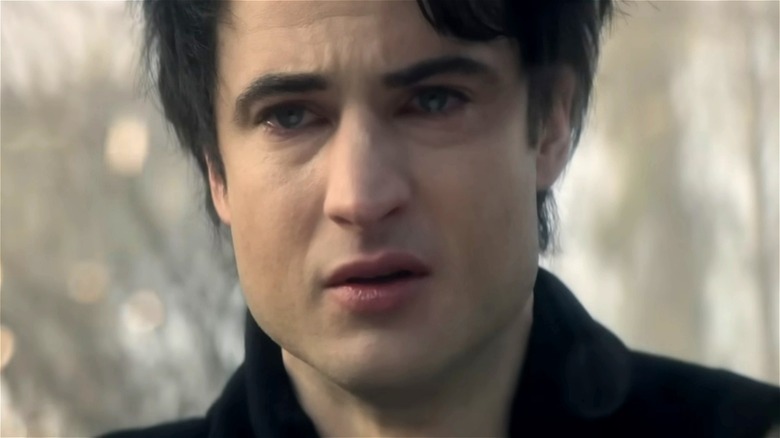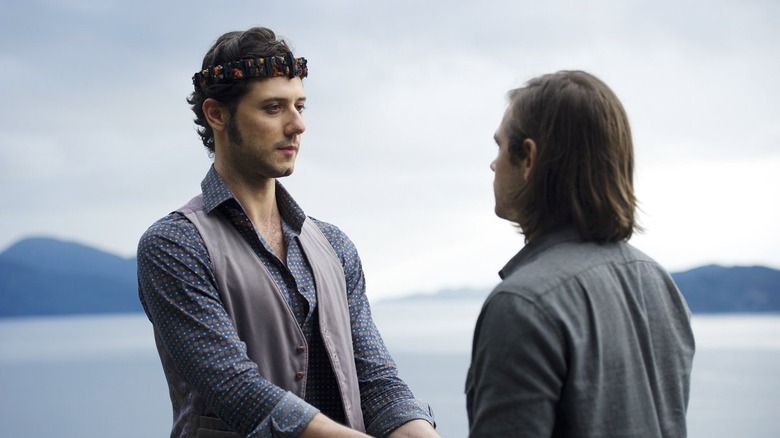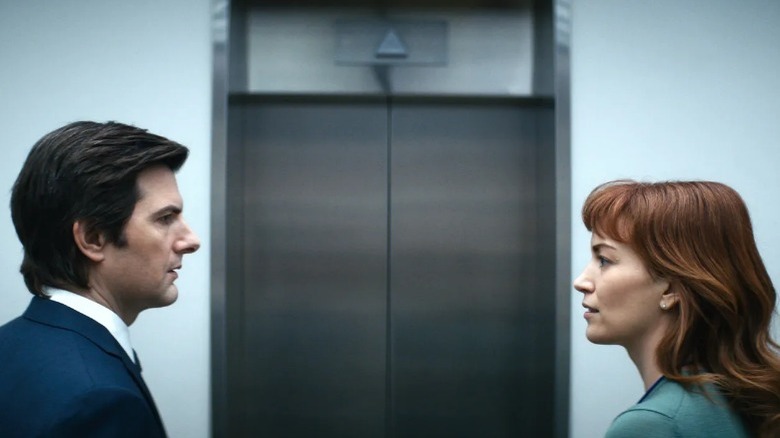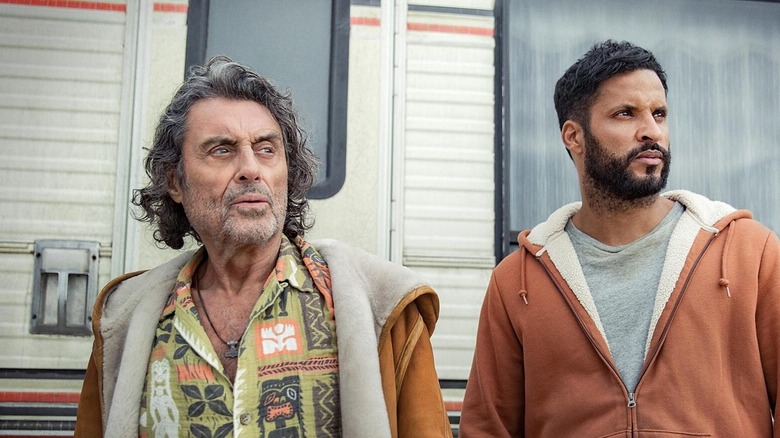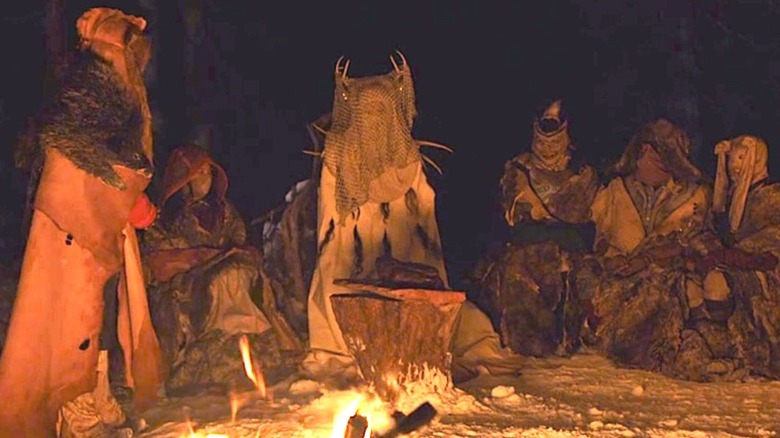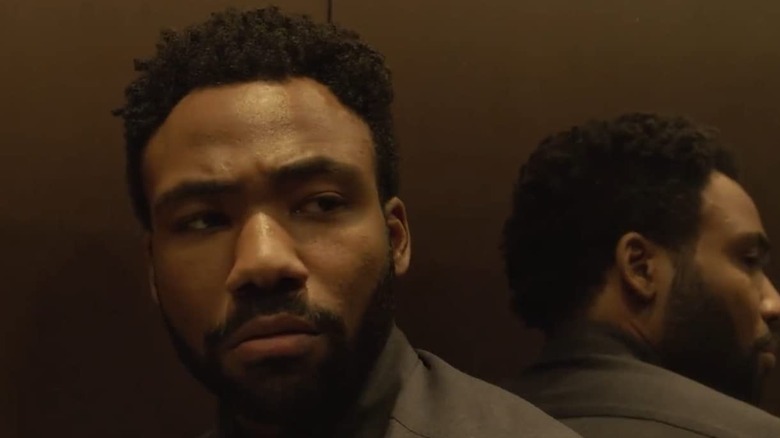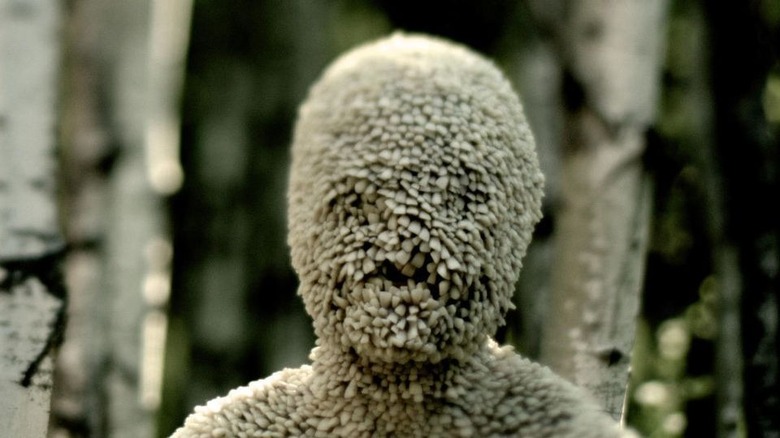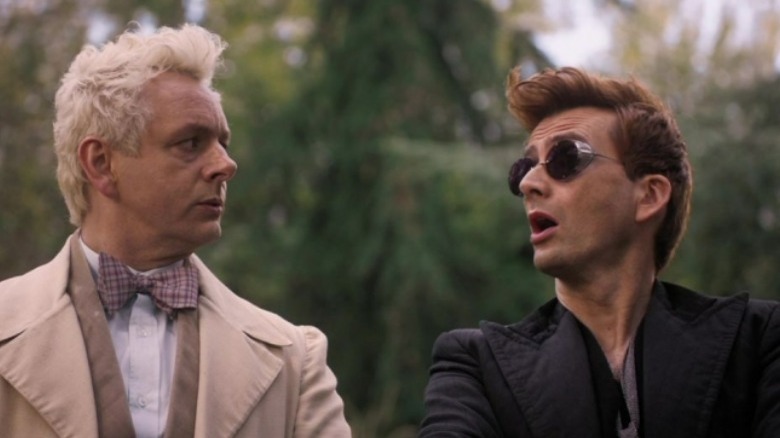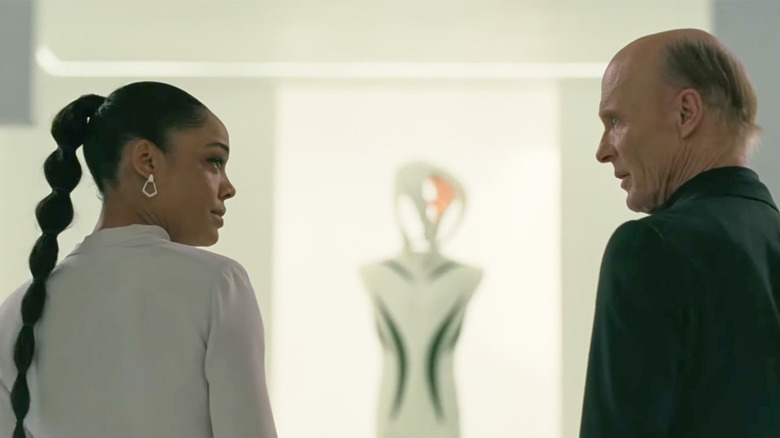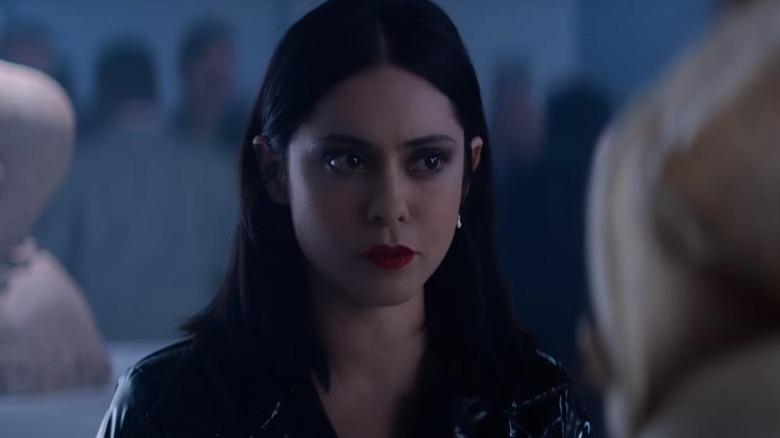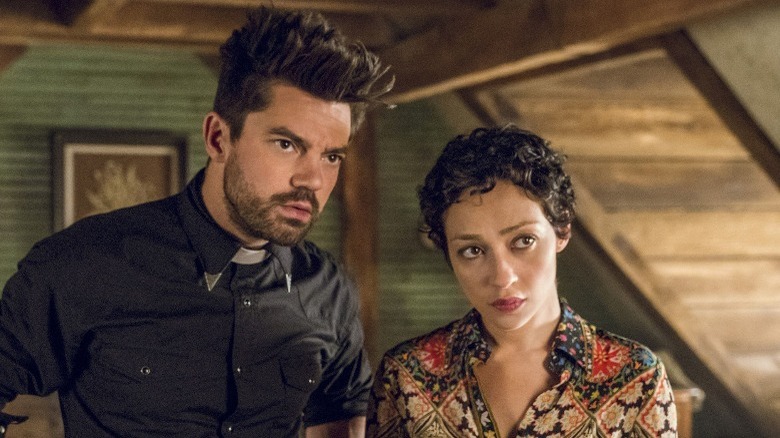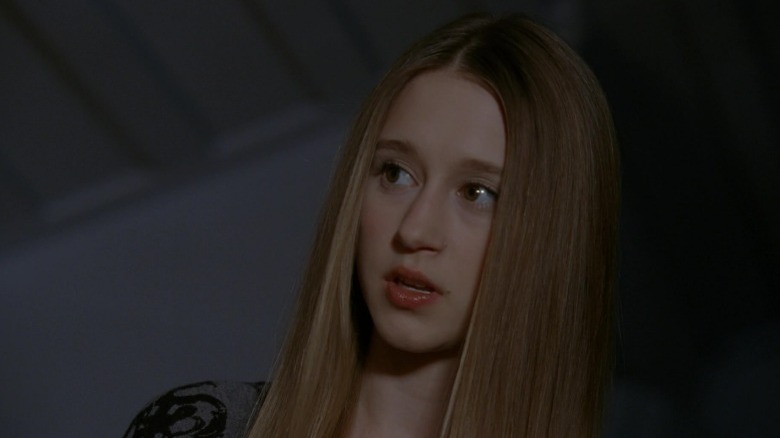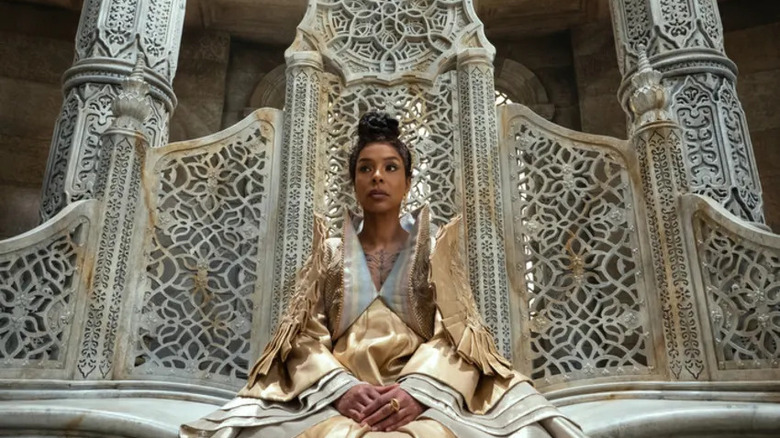12 Best Shows Like The Sandman You Should Check Out Next
Over the course of 75 issues published from 1989 to 1996, DC's "The Sandman" rewrote the rules for comics and storytelling with every outing. It was the flagship title of Karen Berger's world-changing imprint Vertigo Comics, which lasted until the recent introduction of DC's Black Label, and set the tone for a great deal of what followed in the decades to come.
Devotees of the series are known for being more diverse than the typical comic book fare of the time, which has a lot to do with the stories' subject matter and the way it plays out. Now those same fans can enjoy the highly anticipated genre-bending Netflix adaptation, and we've desperately soaked up every detail.
Now that the show is upon us and all that waiting is over, we're left — kind of like Morpheus after his first big adventure — wondering what to do next. Of course, our hopes are for a full adaptation of the whole comic, start to finish, but what should you watch in the meantime?
Well, that's where this list comes in. Here are 12 great shows you'll enjoy just as much as "The Sandman."
The Magicians
"The Magicians" is an easy follow-up choice as it's got all the heart and grimy street magic of "The Sandman," frank attitudes toward sex and love, a great love story or two, as well as roots in classic children's literature.
This "'Harry Potter' in grad school" show was a runaway hit for Syfy right from the start, based on (some would say, improving upon) Lev Grossman's 2009 novel. Queerness, identity, addiction, jealousy, grief, and humor are all the shining jewels in this show, which dotes on its Narnia references the same way Neil Gaiman's work loves his own obscurities.
If you were touched by classic issues such as "The Sound of Her Wings" or any of the incredibly moving Death scenes we get in "The Sandman," know that there is a place for you with "The Magicians," which has a bleeding heart to go with its alcoholic upset tummy. While Inverse notes that the magic of "The Magicians" is almost entirely based around finger-tutting, there is a familiar strain of street magic at work here as well. Hedge witches similar to Mad Hettie from "The Sandman" abound, and eventually become a major political force.
If you enjoy the bigger magical moments of "The Sandman," such as a deceptively young Greek witch bringing the Moon down to a city tenement in "A Game of You" or Roderick Burgess' high magic, you'll find much to love in the adventures of "The Magicians." However, it's the human heart beating under all of it, and possibly some random musical numbers, that you'll remember most fondly.
Severance
You won't find a show with a more bizarre tone on this list than "Severance," the Apple TV+ series that uses a soft sci-fi concept to get at profound truths of the human experience, in the same way that "Sandman" uses fantasy and horror tropes to uncover similar insights.
"Severance" is about an experimental procedure that severs one's work and home lives, a procedure for which people volunteer to undergo for a variety of reasons. What this means in practice is an almost claustrophobic focus on the work environment, which the workers effectively never leave. That alone would make for an interesting (and strange) show, but for "Severance" the concept is only the beginning. What the show is really about is its questions regarding identity, existence, fear, and the banality of evil.
If you enjoy the twists and turns revealed by "The Sandman" as we get to know its rules and rulers, you'll love the way this story unfolds. Beyond that, if you love Death as much as we do, you should be open to the harsh compassion the show holds for its characters. They never give up hope — and, as Morpheus knows, hope is the strongest force there is.
American Gods
Another Neil Gaiman project, "American Gods" is also a story that revolves around the personifications of cosmic concepts (gods here, gods and the Endless in "The Sandman") and how they work within their systems of belief in the modern world — and against each other.
Like Rose Walker and the other occasional human protagonists of "The Sandman," Shadow Moon is an everyman caught in the crossfire of magical and infinitely powerful beings, whose machinations and grudges don't always entirely make sense to him. However, just like Rose, there's more to Shadow than meets the eye.
A great deal of the shows' shared DNA is obvious. Featuring gods as fallible human characters is the most specific commonality, but there is also the way that magic and religion work in both stories. For instance, in "The Sandman," the cat goddess Bast scrapes together adoration from cat fanciers while the love goddess Ishtar survives via the devotion of visitors to a truckstop stripper bar. These combinations — of high and low culture, the urban and the fantastical, the mundane and the magical — are key to the success of both shows.
Yellowjackets
The first season of Showtime's blockbusting "Yellowjackets" picked up seven Emmy nominations, and it's easy to see why. After all, the show features a pitch-perfect tone, dark mysteries, a compelling dual-timeline story, and marvelous performances from two separate casts that set it apart from the beginning.
Like "Sandman," it's decently female-led, with a few powerful male performances throughout — which is not something you might notice at first about "The Sandman," but is definitely a key to its broad appeal.
In "Yellowjackets," a young women's soccer team crashes their plane in the Canadian wilderness, where they survive for 19 months before returning to society. The story also picks up 25 years later, in the here and now, to show us what their lives have become. We see this same juxtaposition frequently in "The Sandman," as Morpheus constantly remembers some new mistake he made or person he wronged in millennia past. Often, the actions and their consequences are presented at the same time.
"The Sandman" and "Yellowjackets" are connected by the cleverness of their writing, the darkness and unforgiving nature of their mysteries, and most of all by their shared take on magic and belief. In both shows, we see that our very survival depends upon creating divinity and meaning from what's around — and in "Yellowjackets" we may even be witnessing the creation of a new magic based on ghosts, dirt, sky, and fire.
Atlanta
While "The Sandman" couldn't exist in comic form without its artists or the crews that brought the show to life, we can say that everything about it ultimately comes down to the decisions of one man: Neil Gaiman. While not technically an auteur series, there are surprising links here to the incredibly personal work that Donald Glover does with his FX series "Atlanta."
The greatest thing about "The Sandman" is how you never know what you're going to get, and that's the promise that "Atlanta" delivers on as well — like "The Sandman," it's a different show every episode. You could find yourself in a claustrophobic dance club for the entire story, wandering around town with one of the supporting characters, or even in a monstrous, spooky mansion plagued by abuse.
A story as complex as the one featured in "Atlanta," which is told over several different genres and styles, absolutely has to earn it. Otherwise, it runs the risk of coming off as needlessly and artlessly complex or even amateur. "Atlanta" has made a name for itself for being just that good every time.
Channel Zero
One of the strangest titles in a list full of odd choices, "Channel Zero" is an anthology series that roots each season in creepypasta, a powerful form of internet folklore.
Children's puppet shows nobody can remember, hungry children made of teeth, city blocks that never existed, cannibal deities in the sky, and a devastatingly creepy clown all sound like something you would probably find in "The Sandman" story. However, "Channel Zero" brings these figures to life in a particularly enigmatic and idiosyncratic way.
Each season the show takes a different creepypasta fragment and crafts a full-length story around it, drawing in metaphysical questions and deeply traumatic memories from childhood. The series shares that sense you get with "The Sandman" in that the world is both much darker and more brilliant than it seems. Perhaps most of all, fans of "The Sandman" will love the uneasy and uncanny feeling you get from most of the creatures and antagonists in the series. Like a Sandman God or Endless, the monsters of "Channel Zero" aren't entirely bad or entirely good — but the slightest misstep can have deadly consequences.
Good Omens
Another Neil Gaiman production, "Good Omens" is based on a 1990 novel collaboration with Terry Pratchett. The story revolves around two pairs of lovers trying to save the world from an apocalypse. On the one hand, you have the charming angel Aziraphale and the charismatic demon Crowley. On the other hand, there's the witch Anathema Device and her man Newton Pulsifer, a descendant of witchfinder Thou-Shalt-Not-Commit-Adultery Pulsifer.
This show has a certain sweet and goofy humor here that comes and goes in "The Sandman," although the stakes seem altogether lower — which is funny since "Good Omens" deals directly with an apocalypse. However, it's a sign of the show's strength that it can inspire a cozy feeling to Ragnarok. The little touches we appreciate everywhere in "The Sandman," like Lucifer's brooding cleverness and exquisite presentation, are definitely here. "Good Omens" also makes a great introduction to Gaiman's work as a whole, especially in comparison to something as rich and vast as "The Sandman."
If you love the human characteristics and fallibility of the Endless and the gods of "The Sandman," you'll enjoy the small-world nature of "Good Omens" portrays when it comes to the forces of good and evil. Even the hilarious machinations of Heaven and Hell are reminiscent of what we see in "The Sandman," although the magic here doesn't flow quite as easily as in other Gaiman projects, like "American Gods" and "Anansi Boys," which could easily take place in the same universe as "The Sandman." All in all, "Good Omens" is a quirky and very British story about love, patience, and the end of the world.
Westworld
Breathtaking in scope, HBO's sci-fi mind-bender was a hit from the word go, and its penultimate 4th Season delivers on its lofty promises. You'll love it for the production values alone, first and foremost, as it's possibly the only show on this list that puts as much money on the screen as "The Sandman."
"Westworld" is about a sprawling map of characters, both mundane and uncanny, each fascinating in their own ways, as they try to achieve freedom. Likewise, "The Sandman" follows a huge ensemble as they try to survive and thrive in a world that's often pretty merciless.
You could even say that without the early example set by "The Sandman," such a woman-centric series about identity and agency like "Westworld" might have never seen the light of day. It's a well written show about stories in the same way as that "The Sandman" is, and like "The Sandman," "Westworld" is beloved by writers and artists alike.
Ultimately, it's the questions at the heart of both shows that resonate, and those remain the same: What is free will for? Who determines our fates? Who are we really? Most importantly, how do we determine our own definition of freedom?
Brand New Cherry Flavor
Probably the most unique entry in this list is "Brand New Cherry Flavor," a cult hit for Syfy that premiered in the summer of 2021. It's the story of an aspiring filmmaker, the demonic grunge of the real Hollywood, and an earthbound demigod with strange and sinister ways of making your dreams come true.
Fans of "The Sandman" will love the gritty street magic, the dark charisma of Catherine Keener's witchy Boro, and a universe whose magical rules can often seem unfair or uncharitable. There are plenty of other reference points to "The Sandman" here, particularly in its female leads. As a young woman in over her head dealing with forces beyond her comprehension, Rosa Salazar's Lisa Nova wouldn't be out of place in classic stories from "The Sandman" such as "A Doll's House" or even "Brief Lives" — she might just remind you a little bit of Rose Walker.
The slightly icky, always hilarious, and bleeding-edge urban magic of the show can be a bit like watching something fantastical crawl out of a sewer, but the show's got a cold wisdom at its heart that feels just like a fairytale.
Preacher
Loosely speaking, "Preacher" is the story of a star-crossed trio of lovers who find themselves on the run — and in pursuit of God himself.
Dark humor, edgy theology, and the bureaucracy of Heaven and Hell are all qualities "Preacher" and "The Sandman" have in common. "Preacher" arose first as a creator-owned comic out of Vertigo in 1995, so the shared DNA between the two shows is apparent. While it's not an anthology like some of the other shows on this list, it is artistically ambitious enough that you never know what you'll get — or where you'll go — within a given episode.
Charming bisexual vampires, cultists, and regular showdowns between epic forces of good and evil are all major qualities of "Preacher," even if — just like "The Sandman" — the exact good and evil in question are sometimes harder to pin down. That's because, just like "The Sandman," "Preacher" takes its inspiration from myth and folklore, putting its own warped twist on stories we all know.
American Horror Story
If you love the sexy horror of early "The Sandman" stories, you'll find much to enjoy in the "American Horror Story" anthology series on FX. Each season opens up a new world of frights as witches, ghosts, vampires, and more come out to play. Strong women abound in both series, thankfully, although happy endings are few and far between. Each season of "American Horror Story," like every storyline in "The Sandman" comics, gives you a self-contained story that links to a wilder, wider universe. There are often questions of morality, too, and "American Horror Story" struggles with them just like they do in the Dreaming.
Fans of the Cereal Convention storyline in "The Sandman" will get a kick out of "American Horror Story: Hotel," which includes a dinner party with several historic serial killers. The low-key seaside dread of "American Horror Story: Red Tide" is akin to the mood of some of the more desperate characters and locations from "The Sandman," such as the boarding house where Rose Walker stays in "A Doll's House." Beyond that, of course, there's plenty of sympathetic magic to go around in "American Horror Story: Coven" and its sequel season, "American Horror Story: Apocalypse," that is similar to what we see characters use in "The Sandman."
The Wheel of Time
Part of the fun of "The Sandman" is learning how all the little bits of its folklore work together. Gods, Endless, and mortals all work with the same rules of magic. It's a layered, complicated universe that spans worlds and dimensions, and learning to exist in that world — as a viewer — is a thrill.
"The Wheel of Time" series takes place in a completely new world, too, with its own complex rules of magic. In the world of "The Wheel of Time," only women can safely use magic, or the One Power, as men who use it tend to go violently insane. As such, the world is ruled by a system of witches known as the Aes Sedai, who separate into different color-coded groups depending on their skills and spheres of influence.
However, there's a much better reason to follow up with "The Wheel of Time," and that's the literary meaning behind its structure: Both "The Wheel of Time" and "The Sandman" show what happens when you take a classic hero's journey and twist it. "The Wheel of Time" has its protagonist in Rand al'Thor and "The Sandman" has the Sandman, Morpheus. But the similarities to the classic quest end there! For Rand, there's an equal possibility that he will end the world as he is trying to save it. Meanwhile, Morpheus' journey takes him from England to Hell and back again. Both are classic quests, performed in very different postmodern ways.
There's nothing quite like "The Sandman," but as long as we're waiting for more, those are your best bets.
